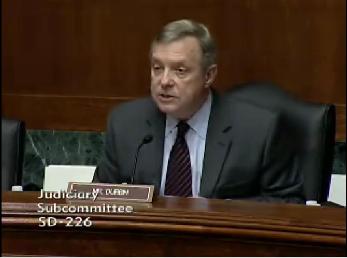Many drug policy reformers saw 1996 and the passage of two favorable state ballot initiatives as the "end of the beginning" for our cause. Does the increasing amount of good news in 2009 mean that this is the "beginning of the end"?
Marijuana legalization seems to have entered the mainstream in the first part of 2009. Drug War Chronicle asks some reform movement players just what's going on -- and what isn't.
After more than two decades of the crack/powder cocaine sentencing disparity and all its racially pernicious effects, pressure is mounting to eliminate it. And now, for the first time, it is the position of the US Justice Department that that should be the case.
With an economic crisis requiring sensible budget cuts, a Constitution-friendly administration and more people joining the drug policy reform movement than ever before, StoptheDrugWar.org has a unique opportunity to make our case.
Two of Canadian "Prince of Pot" Marc Emery's former employees have pleaded guilty to marijuana conspiracy charges in Seattle in return for probation in Canada, but the fate of Emery himself remains up in the air.
Rachel Hoffman was murdered by violent criminals after Florida police coerced the small-time marijuana seller into becoming an informant, and sent her out with $13,000 to buy cocaine and guns. Now, the Florida legislature is attempting to pass a bill that would limit police use of informants, but the cop lobby has already managed to weaken it.
New Hampshire is on the verge of becoming the 14th medical marijuana state after a bill passed the state Senate this week. Now the question is whether the Democratic governor will sign it.
A bill that would establish "compassion centers" for medical marijuana patients has passed the Rhode Island Senate -- again. Gov. Donald Carcieri vetoed a similar bill last year; it's unclear what he will do if the bill passes the House this year.
The Minnesota Senate has approved a medical marijuana bill. It now moves to the House, but Gov. Tim Pawlenty (R) appears poised to veto if it it passes.
Confronted with an unregulated substance enjoyed by young people, the Colorado legislature is responding with a reflexive prohibitionist posture. BZP, meet the drug war.
Mexico's Senate has passed a bill decriminalizing the possession of small amounts of all drugs. It still has to pass the Chamber of Deputies, and the clock is ticking.
A decade ago, Ontario's conservative government passed a law limiting disability benefits to people disabled by alcohol or drug addiction. Now, a provincial court has ruled that violates the province's human rights code.
The latest brainchild of Maastricht, Holland, Mayor Gerd Leers, in his never-ending campaign to clean up problems associated with cannabis cafes on the country's borders with France, Belgium, and Germany, is to make the cafes member-only.
Events and quotes of note from this week's drug policy events of years past.
"In Case You Haven't Heard Enough Cops Talk About Legalizing Drugs This Year...," "Obama Goes to War Against Afghan Opium," "Seriously, Don't Try to Eat Your Marijuana if You're Pulled Over," "Mexican Senate Votes to Decriminalize Drug Possession," "Obama Supports Ending the Cocaine Sentencing Disparity," "Rhode Island Senate Votes to Create Medical Marijuana Dispensaries," "New Hampshire Senate Votes to Legalize Medical Marijuana," "Minnesota Senate Votes to Legalize Medical Marijuana," "Rep. Engel Introduces Bill to Create Independent Drug Policy Commission," "The Federal Government Grows Some of the Worst Marijuana in America," "Even Cowboys Want to Legalize Drugs," "Jim Webb Says Marijuana Legalization is 'On the Table'."
Apply for an internship at DRCNet and you could spend a semester fighting the good fight!
David Borden, Executive Director

David Borden
One of the recurring complaints we receive at Drug War Chronicle is that we publish a lot of bad news. Some readers find it can be hard to take. Some even stop reading; they just find the whole thing too depressing.
That's easy to understand -- there is a lot of bad news in the drug war, and it can be hard to take. Even when the Chronicle's headlines seem hopeful, it only takes a few Google News searches to see that the government's mass arrest campaign, mostly of very low-level, nonviolent offenders, continues unabated. That means bad news for about 4,000 people a day who are arrested across the United States on drug charges, plus all the other countries, and all the other ways the drug war brings trouble and harm and grief.
Still, sometimes the headlines are too good to ignore, even in drug policy. When a friend of mine posted to Facebook this week about THREE medical marijuana bills making significant progress in state legislatures -- not one, but THREE, New Hampshire, Minnesota and Rhode Island -- that caught my attention. When the news crossed my e-mail that the Obama administration would call for federal crack cocaine penalties to be lowered to equal the ones that exist for powder cocaine, at a hearing taking place in the Senate, that caught my attention. And when I read that Mexico's Senate has passed a bill, supported by President Calderón, to decriminalize possession of small quantities of drugs, despite their having gotten raked over the coals by drug warriors in Mexico and the US the last time they tried this, that definitely caught my attention. All of it this week.
There's still plenty of bad news, of course, and the road ahead is still not going to be easy. Mexico's decrim bill is not as good as the one they almost passed the last time. Minnesota's medical marijuana bill faces a strong veto possibility by the congenial but not always reasonable governor of the state, Tim Pawlenty. Reportedly Missouri's Speaker of the House is preventing the bill from even coming up there. Medical marijuana isn't everything, and neither is decrim. The administration is hedging their bets on whether crack sentencing reductions should be retroactive. And of course, the government's mass arrest campaign continues unabated. But the headlines are still too good to ignore.
Twelve and a half years ago, after our movement's first state ballot initiatives passed (Prop. 215 for medical marijuana in California, Prop. 200 for sentencing reform in Arizona), colleagues of mine at the old Drug Policy Letter placed an appropriate Winston Churchill quote on the cover: "[t]his is not the end. It is not even the beginning of the end. But it is, perhaps, the end of the beginning."
In light of all that has changed since then, it's fair to say that 1996 was in fact the end of the beginning. In 2009, are we now experiencing the beginning of the end?
back to top
Sometime in the last few months, the notion of legalizing marijuana crossed an invisible threshold. Long relegated to the margins of political discourse by the conventional wisdom, pot freedom has this year gone mainstream.

Is reason dawning for marijuana policy?
The potential flu pandemic and President Obama's 100th day in office may have knocked marijuana off the front pages this week, but so far this year, the issue has exploded in the mass media, impelled by the twin forces of economic crisis and Mexican violence fueled by drug prohibition. A Google news search for the phrase "legalize marijuana" turned up more than 1,100 hits -- and that's just for the month of April.
It has been helped along by everything from the Michael Phelps non-scandal to the domination of marijuana legalization questions in the Change.gov questions, which prompted President Obama to laugh off the very notion, to the economy, to the debate over the drug war in Mexico. But it has also been ineffably helped along by the lifting of the oppressive burden of Bush administration drug war dogma. There is a new freedom in the air when it comes to marijuana.
Newspaper columnists and editorial page writers from across the land have taken up the cause with gusto, as have letter writers and bloggers. Last week, even a US senator got into the act, when Sen. Jim Webb (D-VA) told CNN that marijuana legalization is "on the table."
But despite the seeming explosion of interest in marijuana legalization, the actual fact of legalization seems as distant as ever, a distant vision obscured behind a wall of bureaucracy, vested interests, and craven politicians. Drug War Chronicle spoke with some movement movers and shakers to find out just what's going on... and what's not.
"There is clearly more interest and serious discussion of whether marijuana prohibition makes any sense than I've seen at any point in my adult lifetime," said Bruce Mirken, communications director for the Marijuana Policy Project. "It's not just the usual suspects; it's people like Jack Cafferty on CNN and Senator Jim Webb, as well as editorial pages and columnists across the country."
Mirken cited a number of factors for the sudden rise to prominence of the marijuana issue. "I think it's a combination of things: Michael Phelps, the horrible situation on the Mexican border, the state of the economy and the realization that there is a very large industry out there that provides marijuana to millions of consumers completely outside the legal economy that is untaxed and unregulated," he said. "All of these factors have come together in a way that makes it much easier for people to connect the dots."
"Things started going white hot in the second week of January," said Allen St. Pierre, executive director of the National Organization for the Reform of Marijuana Laws (NORML). "We had the fallout from the Michael Phelps incident, the Change.gov marijuana question to Obama and his chuckling response, we have the Mexico violence, we have the economic issues," he counted. "All of these things have helped galvanize a certain zeitgeist that is palpable and that almost everyone can appreciate."
"The politicians are still very slow on picking up on the desires of citizens no matter how high the polling numbers go, especially on decriminalization and medical marijuana," said St. Pierre. "The polling numbers are over 70% for those, and support for legalization nationwide is now at about 42%, depending on which data set you use. Everything seems to be breaking for reform in these past few weeks, and I expect those numbers to only go up."
"It feels like we're reaching the tipping point," said Amber Langston, eastern region outreach director for Students for Sensible Drug Policy. "I've been feeling that for a couple of months now. The Michael Phelps incident sent a clear message that you can be successful and still have used marijuana. He's still a hero to lots of people," she said.
"I think we're getting close now," said Langston. "We have moved the conversation to the next level, where people are actually taking this seriously and we're not just having another fear-based discussion."
"There is definitely momentum building around marijuana issues," said Denver-based Mason Tvert, executive director of SAFER (Safer Alternatives for Enjoyable Recreation), which has built a successful strategy around comparing alcohol and marijuana. "Yet we still find ourselves in a situation where change is not happening. Up until now, people have made arguments around criminal justice savings, other economic benefits, ending the black market -- those things have got us to where we are today, but they haven't been enough to get elected officials to act," he argued.
"The problem is that there are still far too many people who see marijuana as so harmful it shouldn't be legalized," Tvert continued. "That suggests we need to be doing more to address the relative safety of marijuana, especially compared to drugs like alcohol. The good arguments above will then carry more weight. Just as a concerned parent doesn't want to reap the tax benefits of legal heroin, it's the same with marijuana. The mantra is why provide another vice. What we're saying is that we're providing an alternative for the millions who would prefer to use marijuana instead of alcohol."
With the accumulation of arguments for legalization growing ever weightier, the edifice of marijuana prohibition seems increasingly shaky. "Marijuana prohibition has become like the Soviet Empire circa 1987 or 1988," Mirken analogized. "It's an empty shell of a policy that continues only because it is perceived as being huge and formidable, but when the perception changes, the whole thing is going to collapse."
Still, translating the zeitgeist into real change remains a formidable task, said Mirken. "It is going to take hard work. All of us need to keep finding ways to keep these discussions going in the media, we need to work with open-minded legislators to get bills introduced where there can be hearings to air the facts and where we can refute the nonsense that comes from our opponents. Keeping the debate front and center is essential," he said.
Mirken is waiting for the other shoe to drop. "We have to be prepared for an empire strikes back moment," he said. "I predict that within the next year, there will be a concerted effort to scare the daylights out of people about marijuana."
Activists need to keep hammering away at both the federal government and state and local governments, Mirken said. "We are talking to members of Congress and seeing what might be doable. Even if nothing passes immediately, introducing a bill can move the discussion forward, but realistically, things are more likely to happen at the state and local level," he said, citing the legalization bill in California and hinting that MPP would try legalization in Nevada again.
Part of the problem of the mismatch between popular fervor and actual progress on reform is partisan positioning, said St. Pierre. "Even politicians who may be personally supportive and can appreciate what they see going on around them as this goes mainstream do not want to hand conservative Republicans a triangulation issue. The Democrats are begging for a certain degree of political maturity from the reform movement," he said. "They're dealing with two wars, tough economic times, trying to do health care reform. They don't want to raise cannabis to a level where it becomes contentious for Obama."
The window of opportunity for presidential action is four years down the road, St. Pierre suggested. "If Obama doesn't do anything next year, they will then be in reelection mode and unlikely to act," he mused. "I think our real shot comes after he is reelected. Then we have two years before he becomes a lame duck."
But we don't have to wait for Obama, said St. Pierre. "We expect Barney Frank and Ron Paul to reintroduce decriminalization and medical marijuana bills," he said. "I don't think they will pass this year, but we might get hearings, although I don't think that's likely until the fall."
It's not just that politicians need to understand that supporting marijuana legalization will not hurt them -- they need to understand that standing its way will. "The politicians aren't feeling the pain of being opposed to remain," St. Pierre said. "We have to take out one of those last remaining drug war zealots."
back to top
In a break with the Bush administration, Justice Department officials called Wednesday for the first time for Congress to pass legislation that would undo the vast disparities in sentences for those convicted of crack and powder cocaine possession offenses. For years, drug reformers, civil rights groups, and even the US Sentencing Commission have called for the disparities to be undone, saying they have had a racially disproportionate impact on poor and minority communities.

Senator Richard Durbin (D-IL) opens the hearing
Under federal sentencing laws adopted in the midst of the crack hysteria of the 1980s, it takes 500 grams of powder cocaine to generate a mandatory minimum five-year federal prison sentence, but only five grams of crack to generate the same sentence. Historically, blacks have accounted for more than 80% of all federal crack convictions, with whites accounting for less than 10%.
Competing bills have been introduced to eliminate or reduce the disparity between crack and powder cocaine sentences, but in previous years they have not gotten far. With the administration now behind eliminating the disparity, this year could be different.
Justice Department Criminal Division Chief Lanny Breuer told a Senate Judiciary Committee subcommittee Wednesday that the administration supported bills that would equalize punishments for crack and powder cocaine offenses. The disparity should be "completely eliminated," he said.
"Now is the time for us to reexamine federal cocaine sentencing policy, from the perspective of both fundamental fairness and safety," Breuer told the Judiciary subcommittee on crime and drugs. He added that a Justice Department panel is reviewing a broad range of criminal justice topics, including sentencing reforms.
It's about time, said Sen. Richard Durbin (D-IL), the Senate majority whip, citing the racially disproportionate crack conviction figures. "These racial disparities profoundly undermine trust in our criminal justice system and have a deeply corrosive effect on the relationship between law enforcement and minority communities," Durbin said.
US District Judge Reggie Walton, representing the Judicial Conference, also addressed the committee. The crack/powder cocaine sentencing disparity is "one of the most important issues confronting the criminal justice system today," he said. "No one can appreciate the agony of having to enforce a law that one believes to be fundamentally unfair to individuals who look like me," said the judge, who is black.
Sentencing reform advocacy groups were also on hand for the hearing. Mary Price, vice president and general counsel for Families Against Mandatory Minimums (FAMM) told the subcommittee the sentencing disparity has a discriminatory impact on blacks, including people like FAMM client Eugenia Jennings, now serving a 20-year prison sentence for twice trading small amounts of crack for designer clothes.
"This hearing gives new hope to thousands who have loved ones serving harsh sentences for low-level, nonviolent drug offenses," Price said.
Even former DEA head and enthusiastic drug warrior Asa Hutchinson had little good to say about the crack/powder cocaine sentencing disparity. "When significant numbers of African Americans on the street question the fairness of our criminal justice system, then it becomes more difficult for the officer on the street to do his or her duty under the law," Hutchinson said.
A number of bills have been filed in both the House and the Senate to address the crack/powder cocaine sentencing disparity. Now, the fight will be to ensure that eliminating the disparity means reducing crack sentences, not increasing powder ones.
Click here to view archived video of the hearing.
back to top
Dear friend of drug law reform:
We have an historic opportunity to change drug policy right now because three major events are happening simultaneously.
I'll explain that in a moment, but first I want to ASK for your support at this important time.
Your membership in StoptheDrugWar.org will enable us to reach people in communities all across our nation and the world. I encourage you to join us today as we launch our exciting new 2009 "Changing Minds, Laws & Lives" campaign.
Now... here are the three converging events that have us so optimistic about 2009:
First, the Obama administration is doing a pretty good job of following through on its campaign promises for drug law reform — not perfect, but pretty good. Second, the economic crisis is forcing all government agencies — including correctional systems — to rethink their financial priorities. And third, we keep breaking visitor records at StoptheDrugWar.org. As the world's #1 source for news, information and activism promoting sensible drug law reform, we know that the more visitors we get, the more we're building the anti-prohibition movement.
Your participation at this point in history is very important, and I'd like to send you some free gifts to show our appreciation.
For a contribution of $36, you can choose either of our new StoptheDrugWar.org T-shirts pictured above — "Prohibition Doesn't Work" or "STOP" (click for an enlarged view). For a gift of $60 or more, you get both shirts. And for a contribution of $100 or more, you also get your choice of any single item from the StoptheDrugWar.org inventory.
Your membership today will make an immediate impact by helping StoptheDrugWar.org (DRCNet):
- Produce more internet videos like "SWAT Raids -- No One is Safe" and fund more actions like our upcoming News Rewriting Project.
- Grow the groundswell for change by helping grassroots organizations — our movement's "boots on the ground" — reach out to more people.
- Pressure the Obama Administration to make good on all of its promises and lobby Congress to make smart funding choices by providing the truth about the Drug War.
- Break more records*! With each improvement to our web site, we become an even more powerful resource for anyone (including media and politicians) to find information about the Drug War.
What you and I and our friends are doing together is working. We can't back off now. By taking advantage of the opportunity we have during this pro-reform climate, we can change minds, change laws and, most importantly, change good people's lives.
Thank you very much,

David Borden
Executive Director, StoptheDrugWar.org (DRCNet)
P.S. It's time to stop wasting time, money and good people's lives. Please join us in "Changing Minds, Laws & Lives" by adding your support to StoptheDrugWar.org while we have this unique opportunity. Thank you!
* We set yet another record for online visitors in March — 235,000 — in a long line of record-breaking months these past two years.
back to top
After striking a deal with federal prosecutors, two employees of erstwhile Vancouver pot seed entrepreneur, continuing marijuana legalization activist and Cannabis Culture magazine publisher Marc Emery pleaded guilty in federal court in Seattle last Friday to conspiracy to manufacture marijuana. They will be formally sentenced June 17, according to a press release from the US Attorney's Office for Western Washington in Seattle.

Marc and Jodie Emery (from cannabisculture.com)
Along with Emery, employees Michelle Rainey and Gregory Williams became known as the
BC 3 after they were indicted by a federal grand jury in Seattle on marijuana distribution charges because of Emery's seed sales enterprise. Authorities in Canada, where marijuana seed distribution is of ambiguous legal status, knew of Emery's business for years, but failed to act harshly against him or his employees.
Rainey and Williams accepted the guilty pleas on the condition that they be sentenced to two years probation to be served in Canada. Both defense attorneys and prosecutors will recommend that sentence. The judge is not bound to agree to that sentence, but the plea agreement stipulates that either party can call off the deal if the judge does not agree to that sentence.
According to court documents, Rainey filled mail orders for seeds, 75% of which were destined for customers in the US. Williams handled phone orders and walk-in customers. He confirmed Emery's claims that the company was grossing more than $3 million a year in seed sales.
Emery ploughed much of his profits back into the marijuana legalization movement and is known as the Prince of Pot for his loudly held positions. US DEA administrator Karen Tandy crowed at the time of his 2005 indictment that his arrest had dealt a blow to legalization forces, but prosecutors later claimed no political motivation for the bust of one of the drug war's loudest critics.
Rainey and Williams will be formally sentenced June 17. Emery's fate remains unclear. He continues to fight extradition from Canada, and a hearing in the British Columbia Supreme Court is set for the first week of June.
back to top
Inspired by the murder of Florida State University graduate Rachel Hoffman, 23, after Tallahassee police sent the small-time pot dealer out with $13,000 to buy cocaine and guns from people she didn't know, the Florida House of Representatives Monday passed a bill that would require police departments to protect confidential informants. But the measure was considerably weakened after law enforcement lobbyists protested it could weaken their ability to wage the drug war.

Rachel Hoffman
Hoffman had been busted on small-time marijuana dealing charges and was on probation when she was busted again in 2007. Rather than face the threat of probation violation and prison time, the young woman agreed to work as a confidential informant for the Tallahassee Police Department. Her body was found in May 2007, 36 hours after she went to meet the drug dealers and lost contact with her police supervisors.
In its current form, the bill, HB 271, would require departments to have written policies on confidential informants and to train officers on those policies. It would also require departments to "consider" factors such as an informant's age and maturity, whether the informant is in drug treatment, and the risk of physical harm.
Hoffman's parents and the bill's sponsor, Rep. Peter Nehr (R-Tarpon Springs), wanted to bar police from using people in drug treatment as informants and from using nonviolent informants to try to entrap people with violent criminal histories. The original version of the bill would also have required police to tell potential snitches they had the right to talk to a lawyer before agreeing to work with police.
But law enforcement lobbyists, including the Florida Sheriffs Association, prevailed in watering down the bill. They told legislators any restrictions would discourage recruitment of snitches and deny them a valuable crime-fighting tool.
"Any one of these things would have saved Rachel's life," Margie Weiss, Rachel's mother, told the Pensacola News Journal after a committee meeting earlier this month where the bill was gutted.
"Rachel Hoffman's death was unnecessary and unneeded," said Nehr after the measure passed the House.
The measure as passed won't provide as much protection to informants as the original bill, but it at least serves notice to law enforcement that it needs to consider more than just making the next drug bust. It now goes to the state Senate.
back to top
New Hampshire is poised to become the 14th medical marijuana state after a bill legalizing the therapeutic use of marijuana passed the state Senate on a 14-10 vote Wednesday. A similar measure has already been approved by the House.

New Hampshire Statehouse
The Senate amended the bill to include a panel to review questions of how patients would access medical marijuana. It also strengthened privacy provisions in the bill. Those changes are seen as minor and are expected to be approved by the House.
The bill would allow patients or their caregivers to grow up to six marijuana plants and possess up to two ounces of usable marijuana. Only patients with enumerated conditions, including chronic pain, seizures, muscle spasms, and severe nausea or vomiting, would be eligible under the bill.
New Hampshire law enforcement lobbyists opposed the bill, and Gov. John Lynch (D) has expressed sympathy for law enforcement concerns. He has also expressed concern that medical marijuana remains illegal under federal law. But he has not said he would veto the bill.
After the vote, advocates launched a statewide ad campaign featuring Multiple Sclerosis patient Sandra Drew, asking Gov. Lynch to sign the bill.
back to top
For the second time, the Rhode Island Senate has approved a bill that would allow dispensaries to provide marijuana to patients qualified under the state's existing medical marijuana law. The bill now heads to the House, where a committee vote was scheduled for Thursday.

Gov. Donald Carcieri, unsuccessful medical marijuana foe
Rhode Island approved a medical marijuana law in 2006, but that law did not provide a legal avenue for patients unable to grow their own medicine or find a caregiver to grow it for them to otherwise procure it. The bill would create "compassion centers" for the distribution of marijuana to people with severe, debilitating illnesses, including cancer, Hepatitis C, and HIV/AIDS.
Some 681 people are already registered with the Rhode Island Department of Health under the state's medical marijuana program.
The Senate approval of the compassion center program came on a 35-2 vote Wednesday. The vote came after bill sponsor Sen. Rhoda Perry (D-Providence) told her colleagues support for the bill was growing and it appeared the state police had dropped their opposition.
The Rhode Island Patient Advocacy Coalition, which has lobbied hard for medical marijuana, praised the Senate for passing the bill. Spokesman Jesse Stout said it would make Rhode Island the second state after New Mexico to authorize nonprofit dispensaries for patients.
The Rhode Island Senate passed a similar bill last year, but it didn't make it through the House. Gov. Donald Carcieri (R) has vetoed medical marijuana bills twice, but was overriden by the legislature. A spokesman for the governor told the Providence Journal he continued to have "serious concerns with how the compassion centers would be set up and regulated."
back to top

Minnesota State Capitol
The Minnesota Senate Wednesday approved
SF 97, the state's medical marijuana bill. Victory came on a narrow 36-28 vote after debate pitting concern about those suffering from the pain of serious illness against fears that allowing patients to use marijuana would result in an increase in drug abuse in the state.
Law enforcement has consistently opposed the medical marijuana bill. But Sen. Steve Murphy (DFL-Red Wing) said during the debate that the issue is a medical issue, not one to be decided by "our brothers and sisters in blue."
The Senate has passed medical marijuana legislation before, but it has not been approved by the House. Advocates, such as the Marijuana Policy Project-backed Minnesotans for Compassionate Care, believe they have the votes to pass the House this year, but they still face a veto threat from Gov. Tim Pawlenty (R). Whether either chamber could muster the votes to override a veto is questionable.
The House is expected to take up the bill next week.
back to top
In an example of legislative reflex response similar to that around salvia divinorum, legislators in Colorado are moving to ban the designer drug N-benzylpiperazine, better known as BZP, despite little evidence presented of its dangers. The measure has already made its way through the House, and won a Senate committee vote Tuesday.

BZP Bart Simpson pill (from publicsafety.utah.gov)
BZP is a controlled substance under federal law, but no states have yet moved against it. The DEA reports no known deaths from BZP, but has reported cases of users suffering psychotic episodes or seizures.
In a 2005 review, the European Monitoring Center for Drugs and Drug Addiction (EMCDDA) reported that BZP has subjective effects similar to amphetamines and thus potential for abuse and dependency, but noted that BZP dependency levels are reported as low in New Zealand, where the drug is quite popular.
The EMCDDA reported seizures in rats at high doses when BZP was taken along with another piperazine, and reports of seizures in humans. "This finding is based on a very small number of cases," the agency noted.
The measure, HB 1157, has already passed the House and passed the Senate Judiciary Committee this week. It has now been referred to the Senate Appropriations Committee.

Evie Hudak
"We are taking the right steps to ensure this drug stays off our streets and out of our schools," said Sen. Mike Kopp (R-Littleton), who is leading the push. "The time is now to give law enforcement the tools they need to go after these drug offenders."
Only two votes were cast against the measure in the judiciary committee. One came from Sen. Evie Hudak (D-Aurora), who cast doubt on the wisdom of the prohibitionist reflex.
"I was hoping that we would go in the opposite direction, that of decriminalizing drugs and other nonviolent offenses, and providing drug treatment, community corrections, proactive community supervision, etc., Hudak told the Denver Daily News. She added that she was not convinced the drug was dangerous.
"The fact that some young people have been found to be in possession of the drug, albeit in a form that is similar to other drugs of abuse -- such as a colored pill shaped like Bart Simpson -- is not enough evidence that the drug is dangerous," continued Hudak. "The testimony indicated that the drug has been consumed at concerts -- that alone is not evidence that the drug is dangerous."
But Hudak's was a lonely voice of reason in Denver.
back to top
The Mexican Senate Tuesday approved a bill that would decriminalize the possession of small amounts of drugs in a bid to undercut Mexican drug trafficking organizations and free police to go after them instead of drug users. The bill was backed by the conservative government of President Felipe Calderón.

map of Mexico (from state.gov)
Under the bill, personal use quantities of drugs could be possessed without criminal liability. The quantities include up to five grams of marijuana, a half gram of cocaine, and smaller quantities of drugs such as heroin and methamphetamine.
The bill would also shift the prosecution of low-level drug dealers to the states by making it no longer a federal crime to sell drugs. The federal government currently prosecutes all drug trafficking offenses, but because federal courts are busy trying higher-level drug traffickers, the cases of lower-level offenders rarely get tried.
The Mexican Congress passed a similar measure in 2006 under President Vicente Fox, but Fox vetoed that bill under pressure from the US. Now, after 10,000 deaths in 2 1/2 years of Calderón's drug war, Mexico appears less inclined to heed US demands to not decriminalize -- and given the change of administration in Washington, the US seems less likely to demand Mexico remain a drug war hardliner when it comes to small-time possession cases.
The measure must still pass the Chamber of Deputies. The congressional session was supposed to end Thursday, but there is some chance it will be extended because of the flu emergency in the capital.
"We celebrate that the legislators have agreed with the proposals of the Social Democratic Party," Mexico City PSD leader Razú Aznar told the official news agency Notimex after the vote. "Our platform proposes that we take legislative measures to eliminate criminal charges against addicts and help them into therapy in a voluntary manner and that they be treated by specialists," he said.
But decriminalization is only a first step, said Razú Aznar. "It is clear for the PSD that the regularization of drugs is at this time one of the best alternatives to reduce the profits of organized crime and eradicate the practice of violence."
Decriminalization may only be a first step, but as of this writing, the Mexican Congress has only completed half of that first step.
back to top
An Ontario law that bars alcoholics and drug addicts from receiving long-term disability benefits violates the provincial Human Rights Code, the Ontario Divisional Court ruled last Friday. The ruling effectively strikes down a provision of the Ontario Disability Support Program enacted by the former Conservative government in 1997 that barred people from receiving long-term benefits if their "sole impairment" was addiction.
Last week's ruling was the latest in a 10-year legal struggle by two Ontario men, Robert Tranchemontagne and Norman Werbeski, who suffer from alcoholism. The pair were denied long-term assistance under the Disability Support Program and were instead found to be eligible only for Ontario Works benefits.
Unlike the disability program, the employment program requires recipients to be involved in "employment assistance activities." Ontario Works also offers substantially smaller benefits, $536 a month, compared to $959 a month under the disability program.
The pair lost when they appealed the ruling to the provincial Social Benefits Tribunal, but in 2006, the Canadian Supreme Court ordered the tribunal to reconsider the case with an eye toward seeing if the law violated the Human Rights Code. The tribunal did so, and found that the exception for addiction disability indeed violated the code.
The Ontario government appealed that ruling, and a hearing was held in December. There, government witnesses argued that almost all addicted people could work and that lower payments could provide an incentive for recovery. But medical experts for the two men retorted that addicts are in a better position to recover if their lives are stable, with low stress, and adequate income to support themselves.
The Ontario Divisional Court justices sided unanimously with the two men. The government failed to provide a "tenable justification" for its decision to treat addicts differently from other people with disabilities, wrote Justice Denise Bellamy for the court. The Ontario law "promotes a stereotypical attitude towards addicted persons. It suggests that those who do not suffer from an additional medically recognized disorder are not genuinely disabled, or in any case are not as disabled as persons with concurrent disorders," wrote Judge Bellamy.
"The Human Rights Code does not permit us to choose between the disabilities we like and those we do not," said attorney Lesli Bisgould. The Ontario government should now "move on" and not bother to appeal any further, she told the National Post.
Ontario is pondering whether to pursue the appeal, government lawyers said.
back to top
All of the cannabis cafes in the Dutch border province of Limburg may be turned into members-only clubs in a bid to stop "drug tourism," the Dutch newspaper Volkskrant reported over the weekend. The proposal came from Gerd Leers, the mayor of Maastricht, the largest town in the province.

downstairs of a coffee shop, Maastricht (courtesy Wikimedia)
Limburg hosts 30 of the cannabis cafes, also known as coffee shops, that attract thousands of visitors from the less cannabis-friendly neighboring countries of France, Belgium and Germany each year. The influx of foreign pot buyers has resulted in problems ranging from traffic congestion to public nuisances to dealing of hard drugs.
Under the Leers proposal, foreigners would not be barred from membership in the clubs, but would have to wait several days to buy cannabis. The proposal would thus discourage spur of the moment cannabis purchases, but would not prevent foreigners who plan ahead from being able to purchase cannabis once they have become members.
Leers' proposal also foresees banning cash sales, which would allow all sales to be traced, thus discouraging foreigners. Leers is also proposing reducing the amount of cannabis that can purchased from five grams to three grams. He said few foreigners would bother to drive to Holland for such a small quantity. [But Leers did not explain why foreigners would bother to drive to Holland to purchase only two grams more now, or what would stop them from visiting multiple cannabis cafes in a European version of smurfing.]
According to the Volkskrant, the Dutch home affairs and justice ministries have reacted favorably to the plan. While the conservative Dutch government would like to eliminate cannabis cafes altogether, it has pledged not to act until after elections next year. In the meantime, effective regulation of the cannabis cafes is in the hands of local authorities, such as Maastricht Mayor Leers.
Cannabis cafe owners declined to discuss their views on the proposal. They said they would wait to react until the proposal is formally presented May 12.
back to top
May 1, 1972: Nobel Prize laureate for economics Milton Friedman is quoted in Newsweek: "Legalizing drugs would simultaneously reduce the amount of crime and raise the quality of law enforcement. Can you conceive of any other measure that would accomplish so much to promote law and order?"
May 3, 1994: Dear Abby states publicly in her column that "Just as bootleggers were forced out of business in 1933 when Prohibition was repealed, making the sale of liquor legal (thus eliminating racketeering), the legalization of drugs would put drug dealers out of business. It also would guarantee government approved quality, and the tax on drugs would provide an ongoing source of revenue for drug-education programs."
May 2, 2001: The Louisiana Senate, voting 29-5, passes sweeping legislation to bring relief to an overflowing state prison system, including ending mandatory prison time for possession of small quantities of drugs.
May 5, 2001: The United States is voted off the United Nations Narcotics Control Board, the 13-member commission that monitors compliance with UN drug conventions on substance abuse and illegal trafficking.
May 6, 2001: Sydney, Australia, opens its first legal heroin injection room in the Kings Cross Neighborhood, operated by the Uniting Church.
May 1, 2003: The Illicit Drug Anti-Proliferation Act of 2003 (IDAPA) is signed into law, among other things amending a section of the Controlled Substances Act to target rave organizers. It shifts the statute's emphasis from punishing those who establish places where drugs are made and consumed, such as "crack houses," to those who knowingly maintain "drug-involved premises," including outdoor events such as rock concerts. In addition to the criminal penalties in the original statute, the amended statute adds a civil penalty, thereby lowering the standard of proof from beyond a reasonable doubt to a preponderance of evidence.
May 6, 2004: The Houston Chronicle reports that Montel Williams threw his support behind legalizing medical marijuana in New York, saying pot helps him cope with multiple sclerosis. Williams, who was diagnosed with a neurological disease in 1999, says he uses marijuana every night before bed to relieve the pain in his legs and feet. "I'm breaking the law every day, and I will continue to break the law," said Williams, host of the syndicated Montel Williams Show.
back to top
Along with our weekly in-depth Chronicle reporting, DRCNet also provides daily content in the way of blogging in the Stop the Drug War Speakeasy -- huge numbers of people have been reading it recently -- as well as Latest News links (upper right-hand corner of most web pages), event listings (lower right-hand corner) and other info. Check out DRCNet every day to stay on top of the drug reform game! Check out the Speakeasy main page at http://stopthedrugwar.org/speakeasy.

prohibition-era beer raid, Washington, DC (Library of Congress)
Since last issue:
Scott Morgan writes: "In Case You Haven't Heard Enough Cops Talk About Legalizing Drugs This Year...," "Obama Goes to War Against Afghan Opium," "Seriously, Don't Try to Eat Your Marijuana if You're Pulled Over," "Mexican Senate Votes to Decriminalize Drug Possession," "Obama Supports Ending the Cocaine Sentencing Disparity," "Rhode Island Senate Votes to Create Medical Marijuana Dispensaries," "New Hampshire Senate Votes to Legalize Medical Marijuana," "Minnesota Senate Votes to Legalize Medical Marijuana," "Rep. Engel Introduces Bill to Create Independent Drug Policy Commission," "The Federal Government Grows Some of the Worst Marijuana in America," "Even Cowboys Want to Legalize Drugs" and "Jim Webb Says Marijuana Legalization is 'On the Table'."
David Guard posts numerous press releases, action alerts and other organizational announcements in the In the Trenches blog.
Please join us in the Reader Blogs too.
Again, http://stopthedrugwar.org/speakeasy is the online place to stay in the loop for the fight to stop the war on drugs. Thanks for reading, and writing...
back to top
Want to help end the "war on drugs," while earning college credit too? Apply for a StoptheDrugWar.org (DRCNet) internship for this summer or fall semester and you could come join the team and help us fight the fight!
StoptheDrugWar has a strong record of providing substantive work experience to our interns -- you won't spend the summer doing filing or running errands, you will play an integral role in one or more of our exciting programs. Options for work you can do with us include coalition outreach as part of the campaign to rein in the use of SWAT teams, to expand our work to repeal the drug provision of the Higher Education Act to encompass other bad drug laws like the similar provisions in welfare and public housing law; blogosphere/web outreach; media research and outreach; web site work (research, writing, technical); possibly other areas. If you are chosen for an internship, we will strive to match your interests and abilities to whichever area is the best fit for you.
While our internships are unpaid, we will reimburse you for metro fare, and DRCNet is a fun and rewarding place to work. To apply, please send your resume to David Guard at [email protected], and feel free to contact us at (202) 293-8340. We hope to hear from you! Check out our web site at http://stopthedrugwar.org to learn more about our organization.
back to top

















